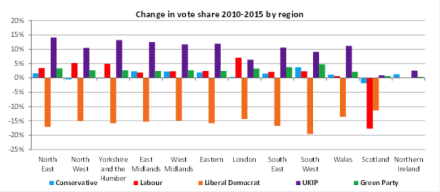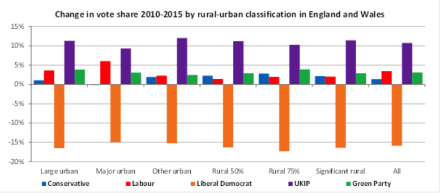Last week’s General Election result has led some to suggest that there is a growing North-South divide in British politics with the electoral map looking similar to a picture of Maggie Simpson. The picture is not that simple.
Although it is true that the Conservative Party garnered 55% of all their votes in the South of England (where 45% of all UK votes are cast), one in four voters in the North East voted Conservative and they gained Berwick-upon-Tweed and one in three in the North West and Yorkshire and Humber with notable gains such as Cheadle, Hazel Grove and Morley and Outwood. Labour picked up just under one third of all its votes in the three Northern regions, but 37% of its votes came from people living in the South (17% of which were in London).
Our regional analysis of the General Election results shows that the biggest stories were not dissimilar to the national picture. A significant swing towards Ukip – nearly 30% in Heywood and Middleton – although they didn’t win a single parliamentary seat in the North, combined with massive losses for the Liberal Democrats where their vote share decreased by up to one third in constituencies in Durham, Hull, Sheffield, Liverpool and Manchester.

Our analysis shows that the largest increases in Labour’s vote share were in the Northern regions – but these were smaller than the increases made in London.
Others have already looked at some of the major cities, and pointed out that Labour did well not only in London, but in other large metropolitan areas. This points to the more compelling ‘story’ behind the General Election results: the urban – rural divide.
But in our more detailed analysis the picture becomes more complex:
• UKIP increased their vote share significantly across all geography types, especially in large urban and “other urban” areas, but least of all in major urban areas;
• Labour increased their share in large/major urban areas especially, but less so in the rural areas;
• the Conservatives saw a minor increase everywhere apart from major urban areas (though saw no significant decline), but increased their share more than Labour in the more rural areas;
• the Greens increased their vote share across all types of area, but especially in large and major urban and very rural areas; and
• the Liberal Democrats lost out across all geographies, though lost marginally less of their share in major urban areas.

Major urban: districts with either 100,000 people or 50% of their population in urban areas with a population of more than 750,000
Large urban: districts with either 50,000 people or 50% of their population in one of 17 urban areas with a population between 250,000 and 750,000
Other urban: districts with fewer than 37,000 people or less than 26% of their population in rural settlements and larger market towns
Significant rural: districts with more than 37,000 people or more than 26% of their population in rural settlements and larger market towns
Rural-50: districts with at least 50% but less than 80% of their population in rural settlements and larger market towns
Rural-75: districts with at least 75% of their population in rural settlements and larger market towns
With the seismic changes in the Scottish political landscape, devolution to major cities, elections in London, Scotland and Wales next year and the prospect of boundary changes in the months to come, territorial politics will become a bigger and bigger feature of the democratic landscape in this country. Holding together a sense of nationhood will become increasingly difficult in an overly centralised state and the prospects of any major party commanding a significant majority in the future remain small notwithstanding last week’s result.
Looking overseas, perhaps the best hope we have for meaningful democratic legitimacy across the nation is through a transition to a more federated state. Alongside a fairer electoral system, this seems the only genuine way in by which to govern such a geographically diverse union. This surely holds out the best hope for progressive politics in the UK.
Ed Cox is Director at IPPR North




More from LabourList
‘If Labour is serious about upskilling Britain, it must mobilise local businesses’
Stella Tsantekidou column: ‘What are we to make of the Labour Together scandal?’
Unitarisation risks weakening local democracy unless communities are put in the driving seat’